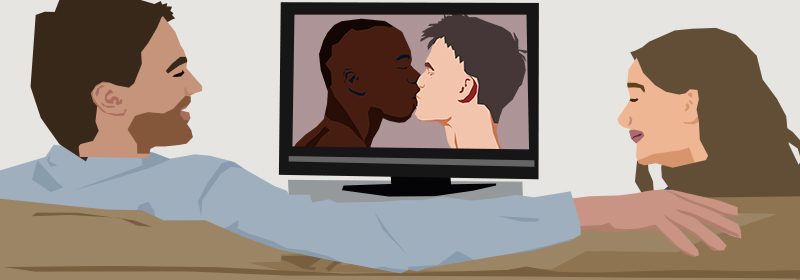The small screen has a big impact for minorities


Media is a powerful thing. Everywhere we go, it’s there. In the car, at the bus stops, in schools, malls, our own homes. Hell, even in bathroom stalls.
There is not one single waking moment we aren’t connected to the world around us. Because of this influence, it is nearly inexpressible how important representation in media is.
Television is a great thing. It gives us media en masse through the commercials and the shows we watch. It has a way of humanizing things, making them relatable in a way that we can either see ourselves in that new car or buying that coffee filter.
Or we can see ourselves being the girl with the hilarious awkwardness coming out in a scene, or being the man marrying his husband with all his family there supporting him. We watch these characters, follow these characters, for a reason. They represent what we want, how we feel and operates under how our society views them.
Take Modern Family for example, with the old-timer dads and their sons who were getting married. Throughout the show, particularly leading up to Cameron and Mitchell’s marriage, both fathers of the grooms kept asking (and even fought over) who was the “woman” in the relationship.
The husbands must explain that neither of them are the “woman,” they’re both men and will both always be men in the relationship.
Of course, we know what the old-timer dads are implying when they ask who the “woman” is. Who is the submissive one, who is the dependent — the one who takes care of the family, while the other goes and earns the money?
The show doesn’t berate the dads, but it also doesn’t use “born in a different time” to excuse their ignorance.
Instead, they present the conflict as a learning opportunity. They explore how alienating it is for Cameron and Mitchell to be asked this by their fathers.
At the same time, it shows the audience how alienating and ignorant it is to ask any same sex couple this question.
While by no means am I saying Modern Family (or any show for that matter) is the solution to our social problems, but at the very least, the show gives us the chance to feel like we’re not alone for half-an-hour. It also gives a chance for the intolerant to see a different side of these issues.
If you’re questioning whether or not this act of representation has validity, then I urge you to consider the Turkish drama What is Fatmagül’s Crime? It’s a heart-wrenching series that touches on a woman’s experience with rape.
In the series, Fatmagül’s fiancé is a local fisherman and on an evening when she’s going to see him off on a trip, she is attacked and raped by three men. When word gets out, Fatmagül’s fiancé leaves her and she is forced to marry one of the assailants.
However, she doesn’t give up. She takes him and the other two to court and refuses to stay silent.
In the series final climax, in the court case that would decide if Fatmagül was guilty or her attackers were, an army of women came to production and marched with the character. These were real women who struggle with the knowledge that their attackers are free and unpunished, who had been raped but couldn’t speak up for fear the repercussions.
These were women who were inspired by the bravery of this fictional character.
Television has the power to give a voice to those who have had their voices silenced in real life. It gives a stage to the struggles we all face. To show that pain is a side effect of the human condition, that we all struggle from the social injustices around the world, unites us.
But representation doesn’t just end at social problems; it’s having the protagonist being a visible minority. The impact of having a protagonist who is confined to a wheelchair but not restricted by it, or a Latinx woman existing in a realm other than the background, has a paramount that most of us take for granted.
There needs to be more depictions of minorities in television in a way that allows them to be more than a marginalized group. Believe it or not, marginalized groups don’t just think about how marginalized they are.
Representation is great and has an important impact. Especially as people become more and more involved with television, we see that importance through shows like Modern Family and What is Fatmagül’s Crime?
But there still needs to be more representation. It shouldn’t be ground-breaking for a show like Luke Cage to exist — it should already be the norm.
We’re doing well, but we need to start doing better.


